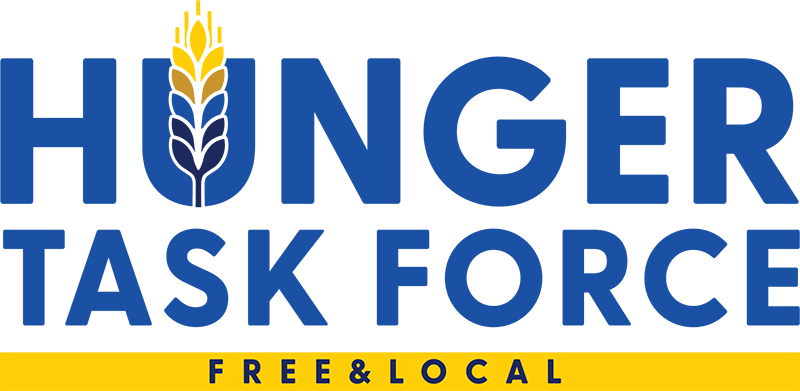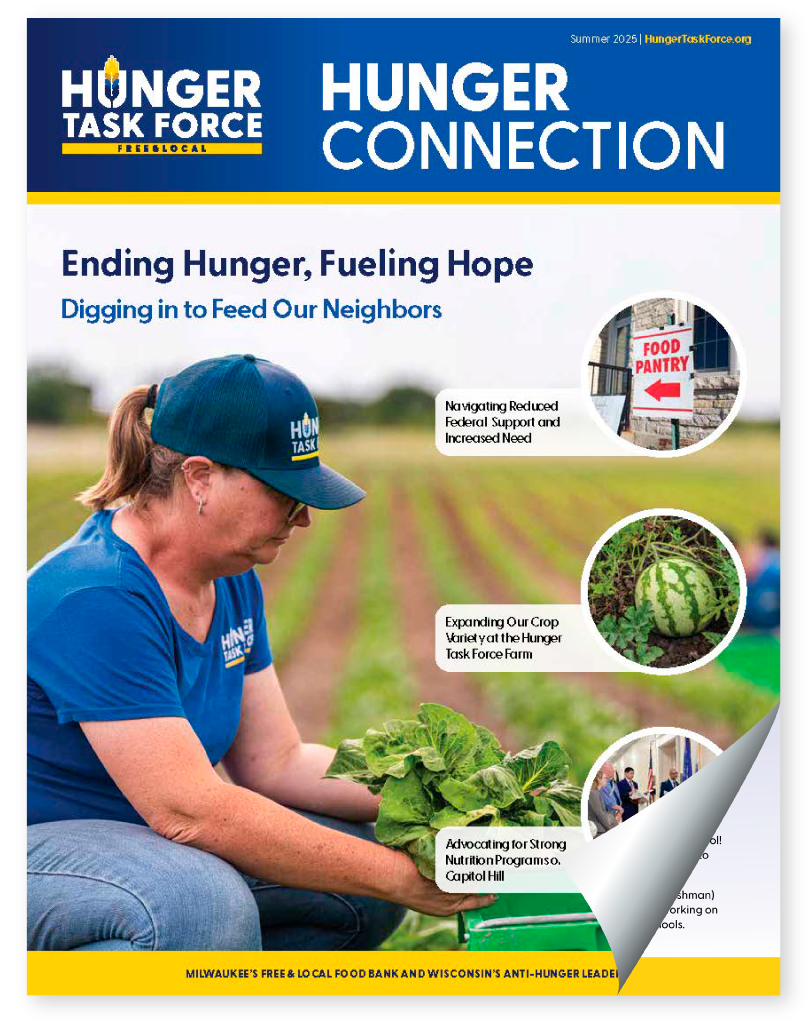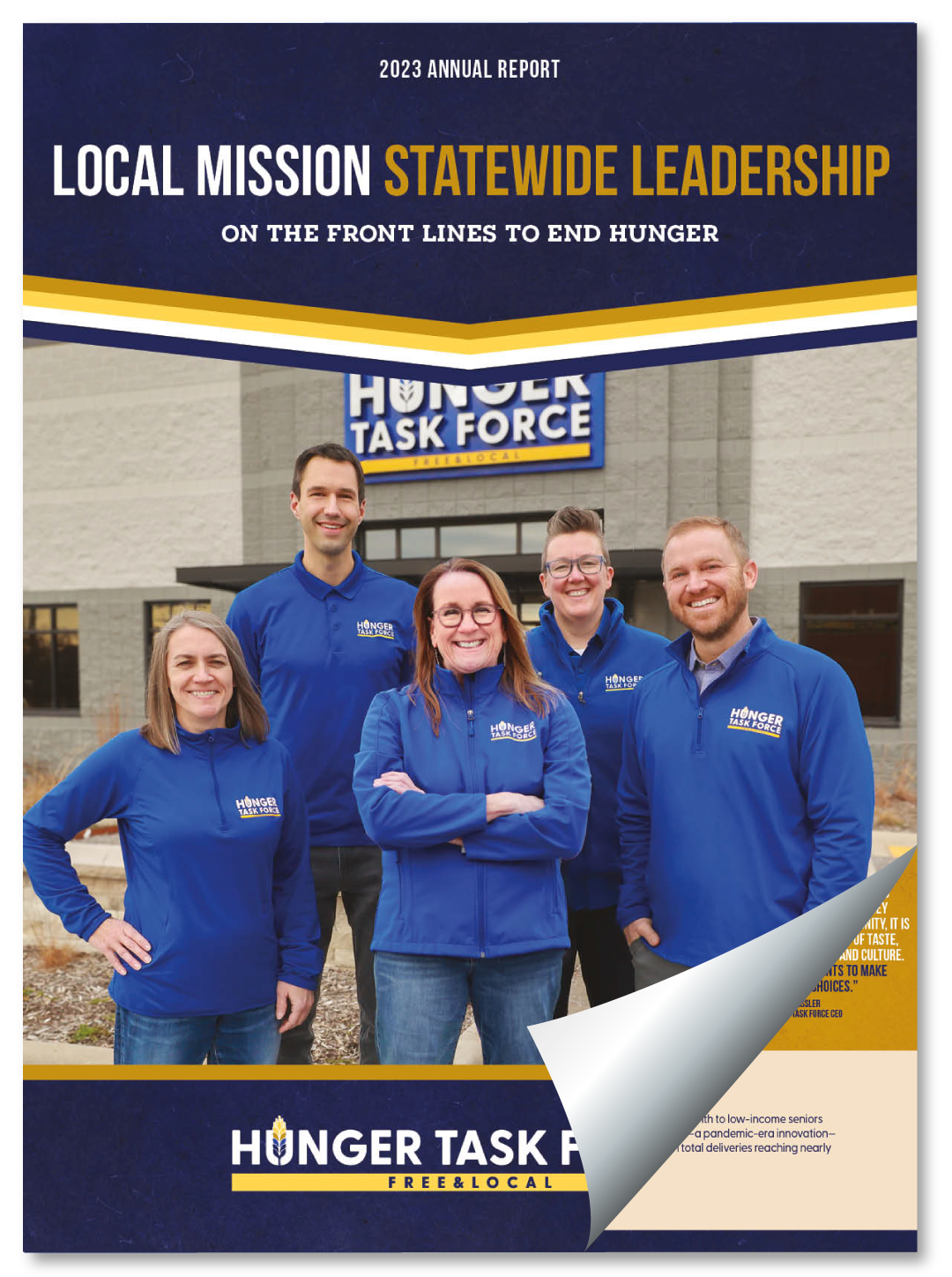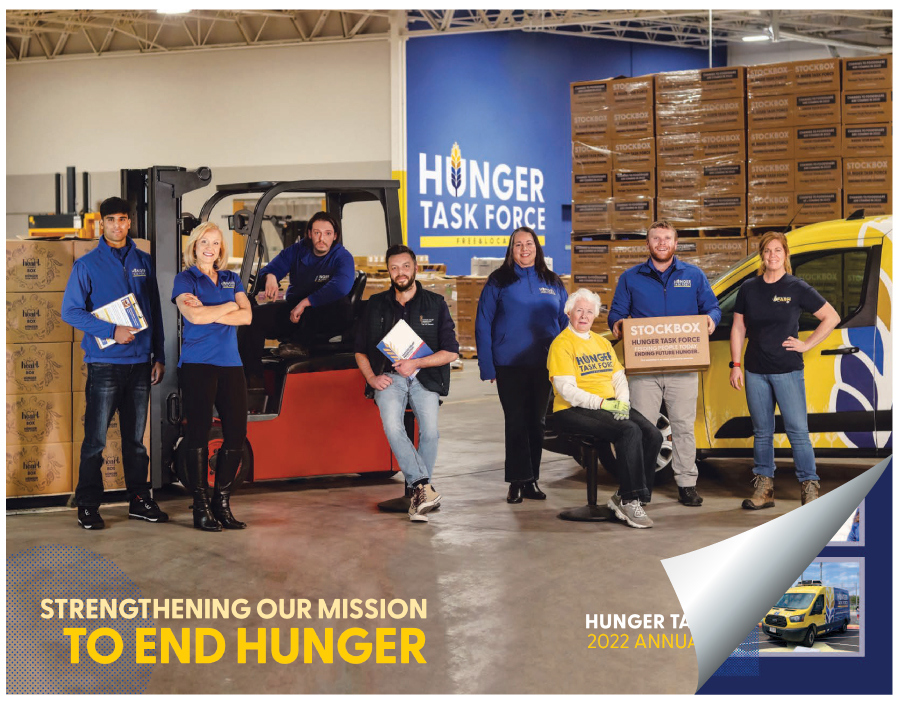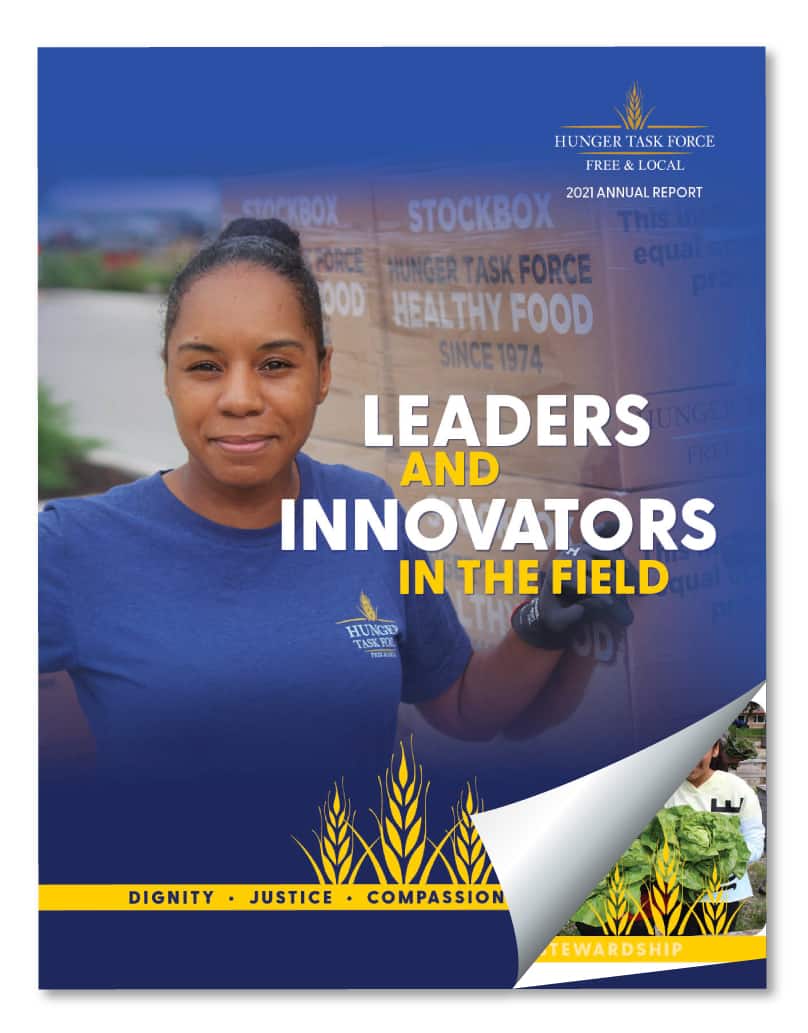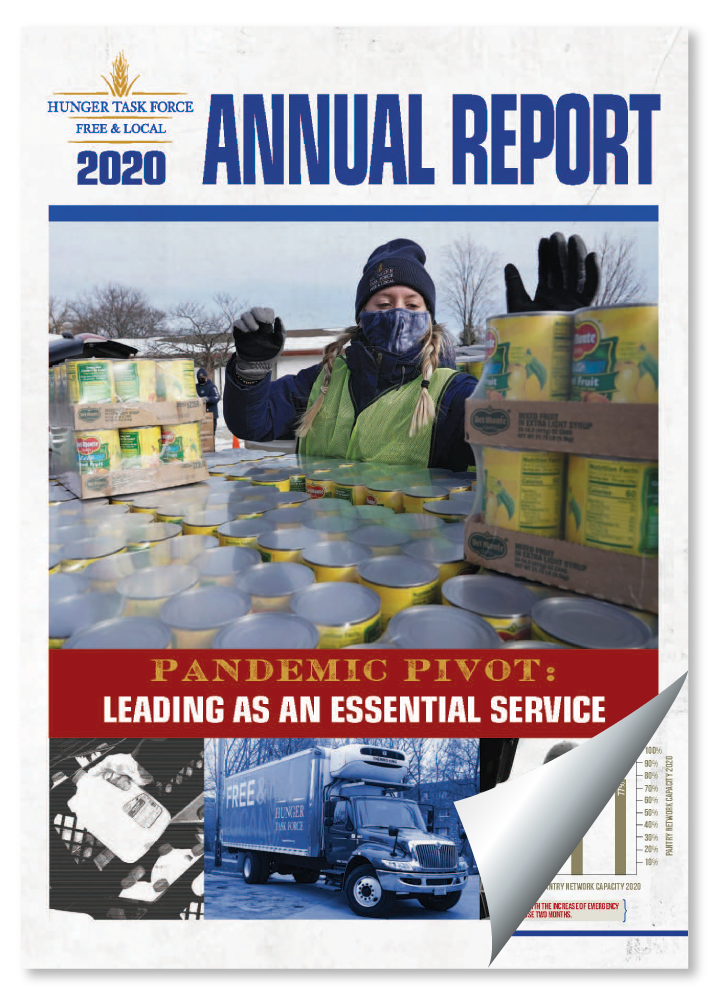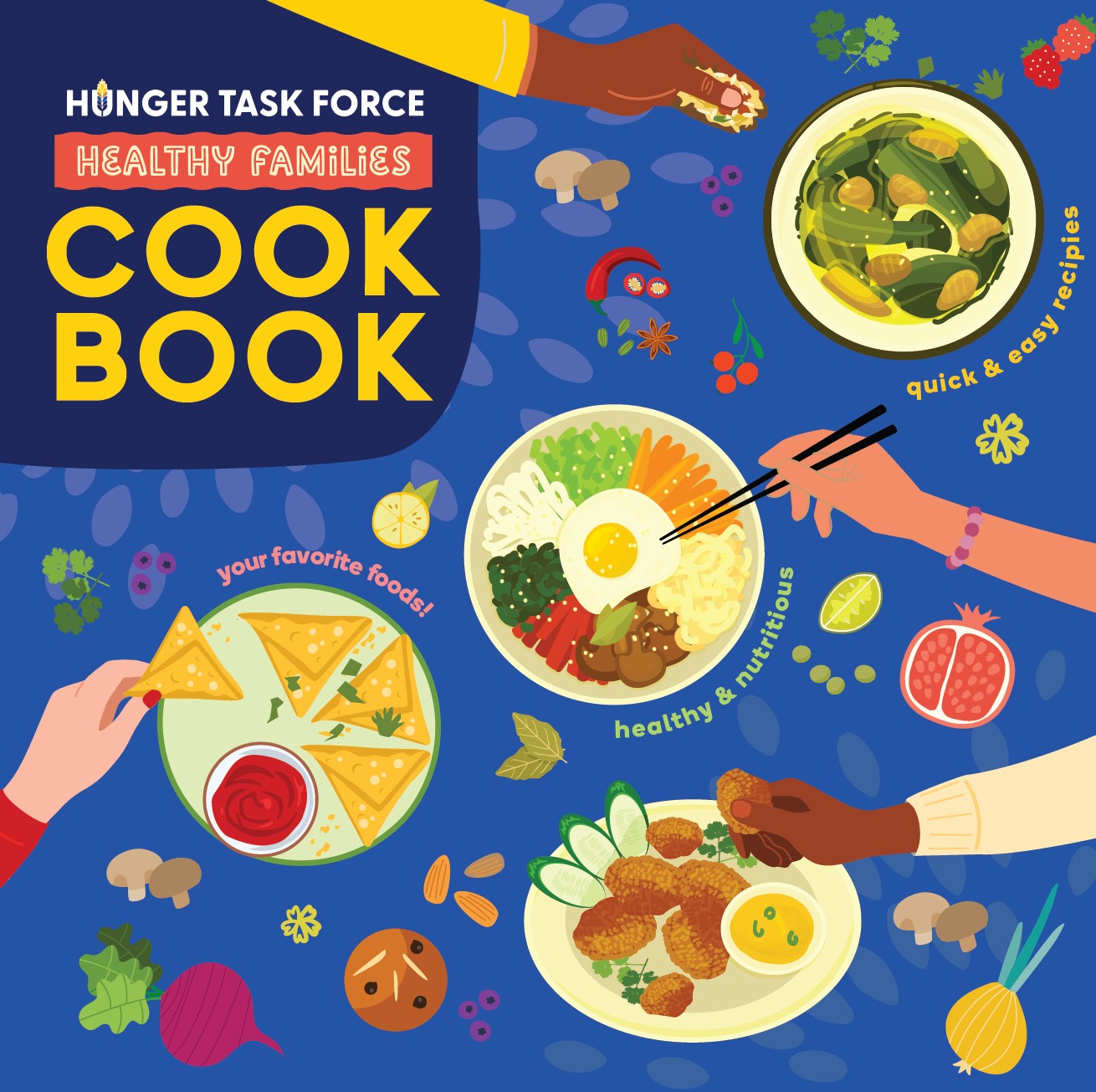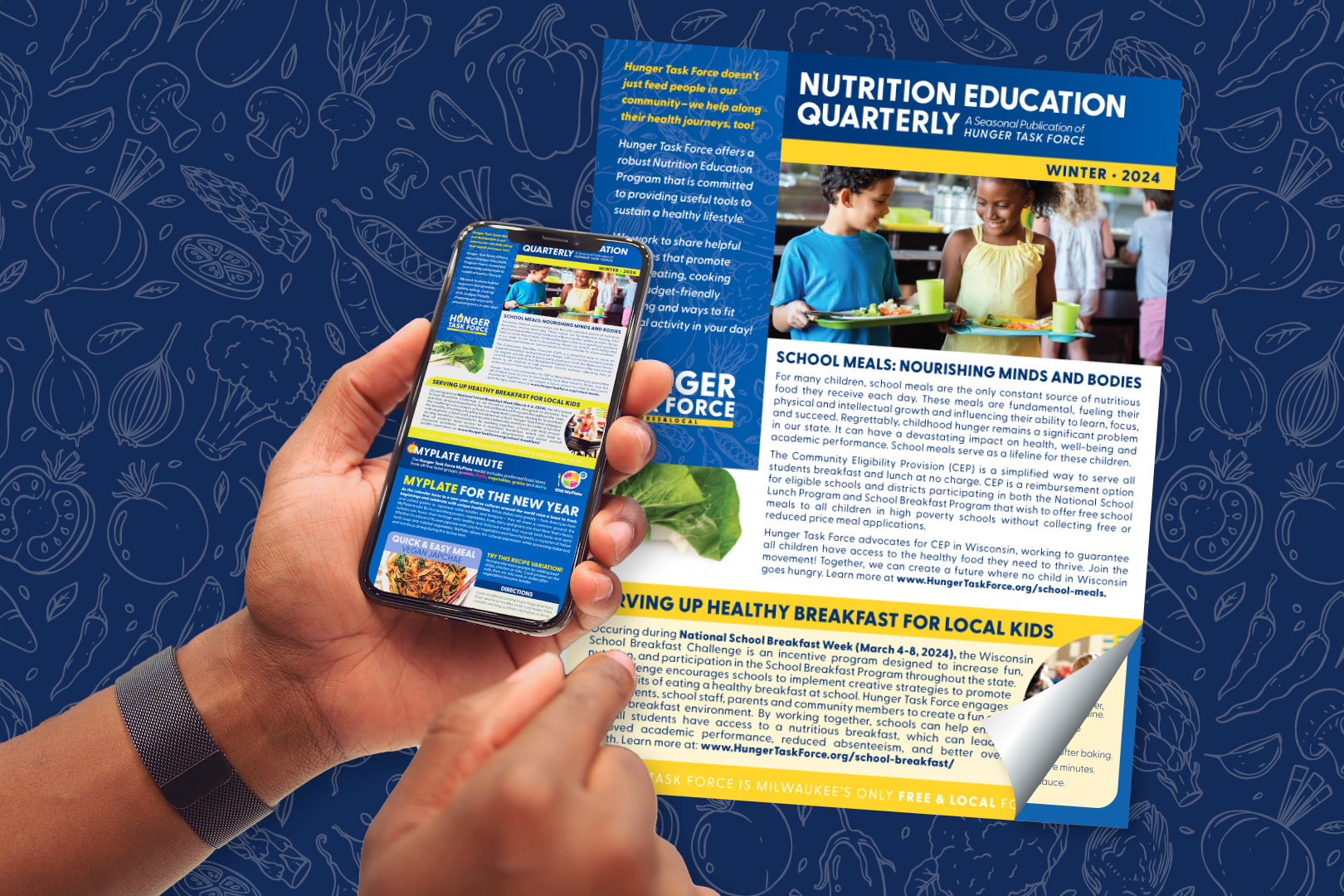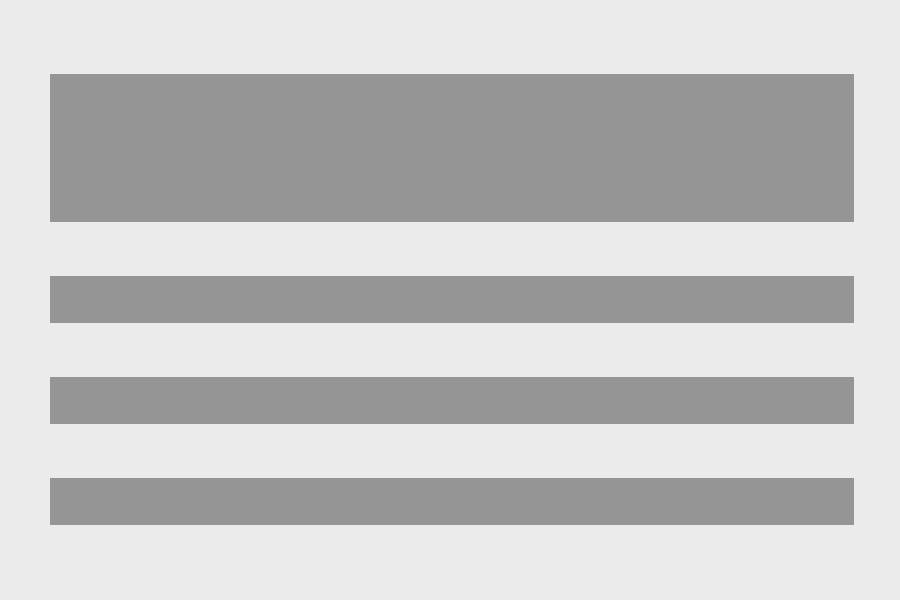Hunger Publications
Hunger Task Force Quarterly Newsletter
Hunger Task Force publishes a quarterly newsletter featuring news, events and updates about all things Free & Local. From exciting events to partner highlights, and from personal stories to getting involved, the Hunger Task Force newsletter is an opportunity to share this anti-hunger work with you. Click on the links below to read through the most recently published newsletters.
2025
2024
2023
2022
Annual Report
Each fiscal year, running October through September, Hunger Task Force prepares an annual report sharing a look at our highlights, challenges and accomplishments. Explore the Annual Reports below to better understand how Hunger Task Force continues to serve as Milwaukee’s only Free & Local foodbank and Wisconsin’s anti-hunger leader.
Healthy Families Cookbook
This cookbook provides a budget-friendly resource for students, families and school partners to cook up new dishes that make healthy choices fun and easy for kids.
The Hunger Task Force “Healthy Families Cookbook” is a wonderful kitchen companion for the whole family! Packed with a variety of easy, nutritious recipes designed to delight both kids and adults, this cookbook is your gateway to creating wholesome meals that the whole family will love.
With step-by-step instructions and handy tips, even the littlest chefs can get involved in the kitchen, making mealtime a fun, interactive experience for the entire family. Say goodbye to the struggle of convincing picky eaters to enjoy their veggies, because our recipes are cleverly crafted to make nutritious ingredients irresistible.
All of these recipes can be modified depending on allergies, food restrictions and family needs!
Nutrition Education Quarterly
Hunger Task Force works with the USDA Food and Nutrition Service to bring nutrition education to SNAP-eligible households in Milwaukee. Our team of nutrition experts gathers recipes, cooking tips, shopping lists and ways to save money on groceries through several nutrition education resources. Utilize the resources below to learn more about making quick, easy, health recipes on a budget, with tools and ways to get the whole family involved!
Hunger Task Force Farm Harvest Report
The Hunger Task Force Farm is a unique 208-acre farm in the suburb of Franklin. During the growing season, The Farm infuses half a million pounds of fresh fruits and vegetables into our food bank’s supply, enhancing the nutrition of those who normally rely on canned or nonperishable foods.
Click on the links below to explore our annual Harvest Reports from The Farm.
The Farm Harvest Report Archive
Research Publications
Hunger Task Force is often tapped as an issue-expert in collaboration with academic research groups and anti-hunger organizations across the country. These groups study Hunger Task Force’s programs and models and synthesize them with research across a broad spectrum of academic fields.
Click below to read published journal articles featuring Hunger Task Force.
Article Archive
- Ending Hunger: How COVID-19 Revealed a Path to Food Access for All (2023)
- Scaling Social Impact: Marketing to Grow Nonprofit Solutions (2022)
- Pandemic Reveals Vulverabilities in Food Access: Confronting Hunger Amidst a Crisis (2020)
- Hunger and Food Well-Being: Advancing Research and Practice (2019)
- Food Access for All: Empowering Innovative Local Infrastructure (2019)
School Breakfast Report
Each year,
The 2017-18 School Breakfast Report is out now! See how your child’s or local school district measure up against others in Wisconsin. The report also contains report cards for the 40 public school districts with the highest number of free and reduced price meal eligible students in the state.
School Breakfast Report Cards
The School Breakfast Report features 40 school districts that have been targeted for in-depth analysis on performance within the School Breakfast Program. These districts were chosen because they have the highest number of children who qualify for free or reduced-price meals.
These report cards evaluate public school districts in Wisconsin in three separate categories: 1) School Breakfast Program Participation, 2) Breakfast TIme and Place, & 3) Community Eligibility Provision. Each category measures how the school district responds to the problem of student hunger.
2017-2018 School Year
- Antigo Unified School District
- Appleton Area School District
- Beaver Dam Unified School District
- School District of Beloit
- Chippewa Falls Area Unified School District
- School District of Cudahy
- DC Everest Area School District
- Delavan-Darien School District
- Eau Claire Area School District
- Fond du Lac School District
- Green Bay Area Public School District
- School District of Greenfield
- Janesville School District
- Kenosha Unified School District
- School District of La Crosse
- Madison Metropolitan School District
- Manitowoc Public School District
- Menasha Joint School District
- School District of the Menomonie Area
- Middleton Cross Plains Area School District
- Milwaukee Public School District
- Neenah Joint School District
- Oak Creek-Franklin Joint School District
- Oshkosh Area School District
- Racine Unified School District
- Sheboygan Area School District
- School District of South Milwaukee
- Sparta Area School District
- Stevens Point Area Public School District
- Sun Prairie Area School District
- School District of Superior
- Tomah Area School District
- Verona Area School District
- Watertown Unified School District
- School District of Waukesha
- Wausau School District
- Wauwatosa School District
- West Allis-West Milwaukee School District
- West Bend School District
- Wisconsin Rapids Public Schools
2016-2017 School Year
- Antigo Unified School District
- Appleton Area School District
- Ashland School District
- Ashwaubenon School District
- Baraboo School District
- Bayfield School District
- Beaver Dam Unified School District
- School District of Beloit
- Brighton #1 School District
- Bristol #1 School District
- Burlington Area School District
- Butternut School District
- Cashton School District
- Chequamegon School District
- Chilton School District
- Chippewa Falls Area Unified School District
- School District of Cudahy
- DC Everest Area School District
- Delavan-Darien School District
- Drummond School District
- Eau Claire Area School District
- Edgerton School District
- Elcho School District
- Elkhorn Area School District
- Elmwood School District
- Fond du Lac School District
- Green Bay Area Public School District
- School District of Greenfield
- Janesville School District
- Kenosha Unified School District
- School District of La Crosse
- Madison Metropolitan School District
- Manitowoc Public School District
- Maple School District
- Marinette School District
- School District of Marshfield
- Mellen School District
- Menasha Joint School District
- Middleton Cross Plains Area School District
- Milwaukee Public School District
- Mukwonago School District
- Neenah Joint School District
- New Richmond School District
- North Crawford School District
- North Fond du Lac School District
- Oak Creek-Franklin Joint School District
- Oneida Nation School System
- Oshkosh Area School District
- Paris J1 School District
- Prairie du Chien Area School District
- Racine Unified School District
- Randall J1 School District
- River Falls School District
- Salem School District
- Shawano School District
- Sheboygan Area School District
- Silver Lake J1 School District
- School District of South Milwaukee
- South Shore School District
- Sparta Area School District
- Stevens Point Area Public School District
- Sun Prairie Area School District
- School District of Superior
- Tomah Area School District
- Trevor-Wilmot School District
- Tri-County Area School District
- Twin Lakes #4 School District
- Verona Area School District
- Washburn School District
- Watertown Unified School District
- School District of Waukesha
- Wausau School District
- Wautoma School District
- Wauwatosa School District
- West Allis-West Milwaukee School District
- West Bend School District
- Wheatland J1 School District
- White Lake School District
- Wisconsin Rapids Public Schools
